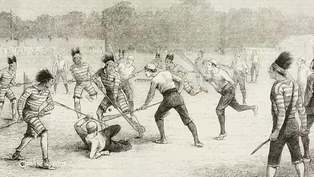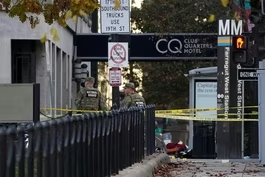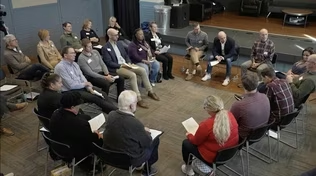
Music therapy helps Chinese elders in Boston overcome trauma
Clip: 11/26/2025 | 8m 5sVideo has Closed Captions
Music therapy helps Chinese elders in Boston overcome trauma
In Boston, music therapy is being used to enrich the well-being of people hoping to overcome trauma. Senior arts correspondent Jeffrey Brown reports for our look at the intersection of art and health, part of our arts and culture series, CANVAS.
Problems playing video? | Closed Captioning Feedback
Problems playing video? | Closed Captioning Feedback
Major corporate funding for the PBS News Hour is provided by BDO, BNSF, Consumer Cellular, American Cruise Lines, and Raymond James. Funding for the PBS NewsHour Weekend is provided by...

Music therapy helps Chinese elders in Boston overcome trauma
Clip: 11/26/2025 | 8m 5sVideo has Closed Captions
In Boston, music therapy is being used to enrich the well-being of people hoping to overcome trauma. Senior arts correspondent Jeffrey Brown reports for our look at the intersection of art and health, part of our arts and culture series, CANVAS.
Problems playing video? | Closed Captioning Feedback
How to Watch PBS News Hour
PBS News Hour is available to stream on pbs.org and the free PBS App, available on iPhone, Apple TV, Android TV, Android smartphones, Amazon Fire TV, Amazon Fire Tablet, Roku, Samsung Smart TV, and Vizio.
Providing Support for PBS.org
Learn Moreabout PBS online sponsorshipNICK SCHIFRIN: And finally from us, singing for harmony.
Therapists in Boston have found a unique way to reach people hoping to overcome trauma.
Senior arts correspondent Jeffrey Brown reports as part of our ongoing coverage of the intersection of health and arts for our Canvas series about music therapy.
(SINGING) JEFFREY BROWN: The morning sing-along at the Greater Boston Chinatown Golden Age Center, popular Chinese songs mostly from the 1960s to '80s, formative years for the participants, older immigrants, now retired, most with little to no English, in many cases without family nearby.
Time for fun and, says Ming Yuan Low, an important form of therapy.
MING YUAN LOW, Assistant Professor, Berklee College of Music: There's a lot of value to Western medicine, but there's also the arts that brings us life.
What is life when you are living to 100 years old, but without enjoyment or without connection to one another?
That's also a form of health.
So, in that way, yes, music therapy can provide health.
JEFFREY BROWN: Low is a music therapist and assistant professor at Boston's Berklee College of Music, known for educating and training top musicians, but also for 30 years for offering a different kind of training for a growing profession that uses music to address physical, emotional, cognitive and other forms of health through a variety of clinical techniques, for this population, Low says, reaching people in unexpected ways.
MING YUAN LOW: Using music in a way to guide our conversations towards things that they don't usually talk about.
JEFFREY BROWN: And you find that that works?
MING YUAN LOW: That works very well because the music experience helps lower their defenses.
They don't know that they're actually processing their past experiences and actually sharing those similar experiences with one another.
They assume that each other has that, but they don't name it.
Music therapy is a chance for them to name it.
JEFFREY BROWN: The Chinatown Golden Age Center, founded in 1972 and now comprising three locations, offers a wide variety of services to Chinese elders, including legal aid, food banks and exercise classes at a drop-in center.
Health services, including mental health, are another big area, especially for an aging population of people who often find themselves linguistically and culturally isolated and alienated and for whom there remains a large stigma to expressing their feelings.
Megan Cheung is the center's associate director and herself a licensed social worker and nurse.
MEGAN CHEUNG, Associate Director and Clinical Director, Greater Boston Chinese Golden Age Center: We see a lot of anxiety disorder.
We see a lot of depression.
For Asian American, we don't tell you that we are depressed.
We only physically exhibit some of the symptoms.
JEFFREY BROWN: They don't say it because?
MEGAN CHEUNG: Because culturally they don't really -- if you tell people that I'm depressed or something, they will look down on you.
Our culture doesn't allow people to express that emotionally.
So I think music therapy is a way to heal.
Sometimes, words cannot express, but music can.
JEFFREY BROWN: Ninety-three-year-old Situ Pin comes to the Golden Age Center every weekday, picked up on a shuttle van.
He's lost his wife and his daughter lives on the West Coast.
The sessions here have helped him speak more openly of his feelings.
SITU PIN, Participant (through translator): I feel lonely and isolated.
I feel that life is meaningless and dull.
There's no joy or purpose in it.
JEFFREY BROWN: So coming here, you get to experience some joy and fun?
SITU PIN (through translator): Music makes me happy.
It helps me forget the things that happened in the past.
JEFFREY BROWN: In fact, Ming Yuan Low believes music is also helping Situ Pin and others in this group, all suffering dementia, with their cognitive memory.
Low and the students working with him use the songs to help prompt conversation, raising simple questions or memories with the dementia patients.
MING YUAN LOW (through translator): Mr.
Pin, where are you from?
SITU PIN (through translator): I'm from Kaiping.
JEFFREY BROWN: With another non-dementia-focused group, the questions were more open-ended and abstract.
MING YUAN LOW (through translator): If you take your friend to your hometown, what are you going to show them?
JEFFREY BROWN: The aim here, to build connections and sociability.
MING YUAN LOW: Mr.
and Mrs.
Mai.
MAI HUI RONG, Participant (through translator): If friends come to Guangzhou, I'm going to host them with... MAI YAO QUAN, Participant (through translator): Crispy roast succulent cake.
JEFFREY BROWN: In this group, the Mais, Hui Rong Lu (ph) and Yao Quan, both 71 and self-described high school sweethearts.
They have been in the U.S.
since 1999 and worked hard in blue-collar jobs before retiring and moving into senior low-income subsidized housing.
And they clearly enjoy these music sessions.
MAI HUI RONG (through translator): Singing makes me happy.
It lifts my mood and keeps me from feeling depressed.
It helps me handle things.
Things better in life and improves my quality of living.
Plus, I get to know more people, and we all feel joyful together.
MAI YAO QUAN (through translator): I have loved singing ever since I was little, especially songs from the 1980s and after.
I enjoy meeting elders and talking about our life experiences and singing together.
It's good for my breathing, and it makes me feel cheerful and happy.
JEFFREY BROWN: The Mais have now started singing at home as well.
MAI HUI RONG (through translator): The two of us sing together while following karaoke tracks on the TV.
JEFFREY BROWN: Do you get up and dance?
MAI HUI RONG: No, no dancing.
MAI YAO QUAN: No dancing.
MAI HUI RONG (through translator): Just sing.
(LAUGHTER) JEFFREY BROWN: Just how much this kind of therapy impacts the rest of participants' lives and overall health is an area of continuing study; 21-year-old Jie Wen Ong from Hong Kong and Singapore studies music therapy, as well as voice, at Berklee.
She helps lead these sessions as part of her clinical training.
JIE WEN ORG, Student, Berklee College of Music: A lot of music therapy goals, we aim to make them transferable.
What that means is that we design goals in the session, for example, preventing cognitive decline, or engaging with participants, or increasing happy emotions.
And through that, we hope that participants would transfer those skills into their own life.
JEFFREY BROWN: Twenty-three-year-old Irene Chow from Hong Kong majors in both piano and music therapy.
IRENE CHOW, Student, Berklee College of Music: Music therapy brings our psychology and music together.
As I play piano, I can feel really different emotions through playing different chords.
And I want to let the clients or let other people can feel different emotions through music as well.
I think that's so powerful.
JEFFREY BROWN: As for Ming Yuan Low, one of their Berklee College of Music professors, he cites continuing studies in the field of neuroscience, as well as what he and other music therapists are experiencing in the field.
MING YUAN LOW: There's so much we are working on right now to understand what is happening to us physiologically as human beings when we're experiencing music, and we haven't even scratched the surface yet.
What Berklee is focused on in right now is, what do our patients want from us?
What do our communities want from us?
How do we evaluate that?
And how can we deliver services that patients want?
JEFFREY BROWN: A small program centered on one specific community, a growing field finding new ways to impact and enrich lives.
For the "PBS News Hour," I'm Jeffrey Brown at the Greater Boston Chinatown Golden Age Center.
Army OB-GYN accused of recording women under his care
Video has Closed Captions
Clip: 11/26/2025 | 7m 34s | Army OB-GYN accused of secretly recording women under his care (7m 34s)
The factors influencing turkey prices this Thanksgiving
Video has Closed Captions
Clip: 11/26/2025 | 4m 9s | The factors influencing turkey prices this Thanksgiving (4m 9s)
Final criminal case against Trump dismissed
Video has Closed Captions
Clip: 11/26/2025 | 4m 24s | Final criminal case against Trump dismissed after Georgia prosecutor drops charges (4m 24s)
Holiday travel delays piling up as winter storm wreaks havoc
Video has Closed Captions
Clip: 11/26/2025 | 2m 19s | Holiday travel delays piling up as winter storm wreaks havoc (2m 19s)
The lesser-known history of a uniquely American sport
Video has Closed Captions
Clip: 11/26/2025 | 5m 4s | The lesser-known history of lacrosse, a uniquely American sport (5m 4s)
National Guard members wounded in 'targeted' attack in D.C.
Video has Closed Captions
Clip: 11/26/2025 | 2m 44s | National Guard members wounded in 'targeted' attack in Washington, D.C. (2m 44s)
News Wrap: Hong Kong high-rise fire kills dozens
Video has Closed Captions
Clip: 11/26/2025 | 4m 6s | News Wrap: Hong Kong high-rise fire kills dozens (4m 6s)
Ohio group seeks common ground on immigration reform
Video has Closed Captions
Clip: 11/26/2025 | 9m 40s | In Ohio, a bipartisan community group seeks common ground on immigration reform (9m 40s)
Push for peace in Ukraine complicated by leaked U.S. call
Video has Closed Captions
Clip: 11/26/2025 | 4m 4s | War rages in Ukraine as push for peace complicated by leaked call from U.S. negotiator (4m 4s)
Providing Support for PBS.org
Learn Moreabout PBS online sponsorship
- News and Public Affairs

FRONTLINE is investigative journalism that questions, explains and changes our world.

- News and Public Affairs

Amanpour and Company features conversations with leaders and decision makers.












Support for PBS provided by:
Major corporate funding for the PBS News Hour is provided by BDO, BNSF, Consumer Cellular, American Cruise Lines, and Raymond James. Funding for the PBS NewsHour Weekend is provided by...








